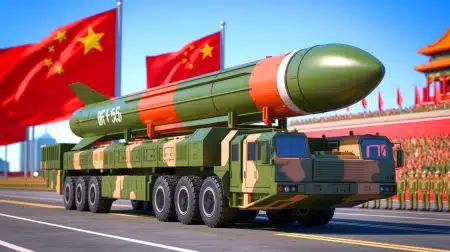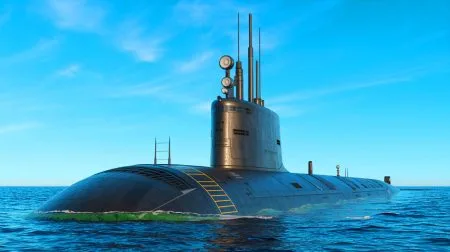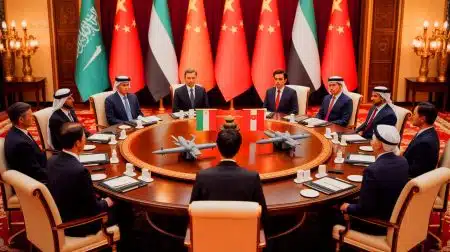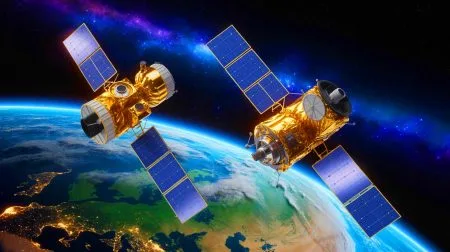| IN A NUTSHELL |
|
The dynamics between the United States and China have long been a focal point in international relations, with shifting political landscapes often influencing the global peace balance. Recent developments have intensified concerns, particularly with Donald Trump’s return to the White House, a move perceived by some analysts as a catalyst for increased military conflicts and global uncertainty. This article explores the implications of these changes, shedding light on the potential for the United States to become embroiled in international conflicts, especially in regions where its allies are involved.
Trump’s Return and the Rise of Military Tensions
With Donald Trump back in the Oval Office, concerns about rising global military tensions have resurfaced. Chinese analysts point to a significant risk of the U.S. being drawn into conflicts involving smaller nations or its allies. The recent U.S. intervention in the Israel-Iran conflict exemplifies this risk. The military operation, which targeted three nuclear sites in Iran, was described by U.S. officials as a one-off intervention. However, the subsequent missile attack by Iran on a U.S. base in Qatar has raised alarms about the potential for escalation.
Trump’s leadership style and foreign policy decisions have historically been characterized by assertiveness and unpredictability. This has led to a perception that his administration may inadvertently catalyze conflicts, drawing the U.S. into wars that could otherwise be avoided. The international community watches closely as these developments unfold, with China expressing concern over breaches of international law and the implications for global stability.
China’s Strategic Concerns and Diplomatic Reactions
As a key partner of Iran, China has vocally condemned the recent U.S. military operations, emphasizing the breach of international law. China’s diplomatic stance highlights its strategic concerns over the potential destabilization of the region, which could have broader implications for global peace and security. The Chinese government has consistently advocated for diplomatic solutions and cautioned against unilateral military actions that could exacerbate tensions.
Beijing’s response underscores a broader trend of advocating for multilateralism and de-escalation in international conflicts. Chinese foreign policy experts, like Yan Xuetong, argue that Trump’s approach is accelerating a trend of deglobalization, further contributing to the uncertainty in international relations. As China prepares for the World Peace Forum in Beijing, the focus will likely be on fostering dialogue and exploring peaceful resolutions to ongoing conflicts.
Implications for Global Order and Deglobalization
The current geopolitical climate, marked by Trump’s leadership, is seen as a period of accelerated deglobalization. This trend, initiated during Trump’s previous term, suggests a shift away from cooperative international governance towards more isolated national policies. The implications for the global order are profound, with increased military conflicts threatening to disrupt existing alliances and diplomatic frameworks.
Yan Xuetong’s insights reveal a landscape where international relations are becoming increasingly fragmented. The unpredictability associated with Trump’s policies may lead to a realignment of global powers, with countries like China positioning themselves as advocates for a stable and cooperative international order. The challenge remains in balancing national interests with the need for global cooperation in addressing shared challenges.
The Future of US-China Relations Amid Global Uncertainty
The evolving relationship between the U.S. and China is pivotal to the future of global peace and stability. With Trump’s return to power and the perceived increase in military conflicts, the bilateral relationship faces new challenges. Both nations must navigate a complex web of strategic interests, economic dependencies, and geopolitical tensions.
As the international community grapples with these changes, the potential for collaborative problem-solving remains. Dialogue, diplomacy, and mutual respect are essential components in preventing further escalation and fostering a peaceful coexistence. The path forward requires careful negotiation and a commitment to addressing the root causes of conflict, rather than responding with military force.
As we reflect on these developments, it is crucial to consider the broader implications for global peace and security. How will the U.S. and China manage their differences to ensure a stable international order, and what role will other nations play in this evolving landscape? The answers to these questions will shape the future of international relations for years to come.
Did you like it? 4.5/5 (30)







Interessanter Artikel, aber was ist die Wahrscheinlichkeit, dass es tatsächlich zu einem globalen Konflikt kommt? 🤔
Ich finde es beunruhigend, wie leichtfertig einige Politiker mit dem Thema Krieg umgehen.
Ist es nicht ironisch, dass wir im 21. Jahrhundert immer noch über globale Kriege sprechen? Sollte nicht Diplomatie im Vordergrund stehen?
China scheint wirklich besorgt über die US-Politik zu sein. Aber sind sie selbst wirklich so unschuldig?
Trump wieder im Weißen Haus? Oh je, da wird’s wohl keine ruhige Minute geben! 😅
Frage mich, wie Biden die Sache anders angegangen wäre. 🤷♂️
Könnte ein Konflikt zwischen den USA und China wirklich die gesamte Weltordnung verändern?